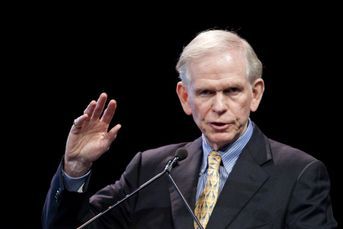Debt talks push stocks higher for second day in a row
S&P 500 Index reaches highest level since September.
U.S. stocks rose, sending the Standard & Poor’s 500 Index (SPX) to the highest level since September, on speculation lawmakers were making progress toward an agreement on raising the debt limit to avoid a default.
The S&P 500 increased 0.6% to 1,703.19 at 4 p.m. in New York, erasing losses since the government’s partial shutdown that began Oct. 1.
“We are picking up smoke signals that there are constructive talks,” Jim Russell, who helps oversee $112 billion as a senior equity strategist for US Bank Wealth Management. “It doesn’t take much imagination to see that a framework is coming together for a temporary extension of the budget ceiling, and then negotiations to reopen the government as early as next week. We do think that things are moving forward.”
The S&P 500 jumped 2.2% Thursday, the most since Jan. 2, on a House Republican proposal for a short-term increase in the debt ceiling that would reduce the prospects for a U.S. default. The index gained 0.8% this week and is about 1.3% away from a record 1,725.52 reached on Sept. 18.
House Republicans offered a plan to raise the debt limit and end the shutdown that would require the president to accept policy conditions attached to a spending measure, said two congressional aides. Republicans sent a list of policy options to the White House, following a meeting yesterday, said the aides, who spoke on condition of anonymity.
President Barack Obama has insisted that he wouldn’t accept any conditions for reopening the government, which has been partially shut for 11 days after Republicans sought changes to the 2010 health-care law.
Borrowing authority
Without an increase to the debt limit, the U.S. will exhaust its borrowing authority on Oct. 17 and would run out of funds to pay all of its bills sometime between Oct. 22 and Oct. 31, according to the Congressional Budget Office.
“The quicker we can get this sideshow out of the way, the quicker that investors can focus on the actual fundamentals,” Mr. Russell said. “It’s critical because every day that we’re hanging out there without the federal government being up and running, it damages the economy, it damages earnings, it damages investor confidence.”
The U.S. must take “urgent action” to resolve the political logjam, the Group of 20’s central bankers and finance ministers said in a statement during their meeting in Washington Friday.
Economic impact
The partial federal government shutdown lasting through the end of this week would pare 0.2 percentage point from U.S. economic growth and cost as much as 0.5 point if it continues another two weeks, according to the median estimate in a Bloomberg survey of economists taken Oct. 4-9.
Data Friday showed consumer sentiment in the U.S. fell in October to a nine-month low as the shutdown and the debt-ceiling debate caused outlooks to sour. The Thomson Reuters/University of Michigan preliminary consumer sentiment index slid to 75.2 this month from 77.5 in September. Economists projected a drop to 75.3, according to the median estimate in a Bloomberg survey.
Better-than-expected earnings and three rounds of monetary stimulus from the Federal Reserve have helped drive the S&P 500 up as much as 155% from a 12-year low. The benchmark gauge has rallied 19% this year as data from manufacturing to housing and the labor market improved.
“Remove everything that’s going on in Washington and focus on global economic growth and earnings, it should be clear that things are picking up,” Joseph Tanious, global market strategist for J.P. Morgan Asset Management, said by phone from New York. His firm oversees about $1.5 trillion.
With few economic reports available during the shutdown, investors are watching third-quarter corporate earnings. Profits for companies in the S&P 500 probably increased 1.4% during the three months while sales rose 2%, according to analysts’ estimates compiled by Bloomberg.
(Bloomberg News)
Learn more about reprints and licensing for this article.








